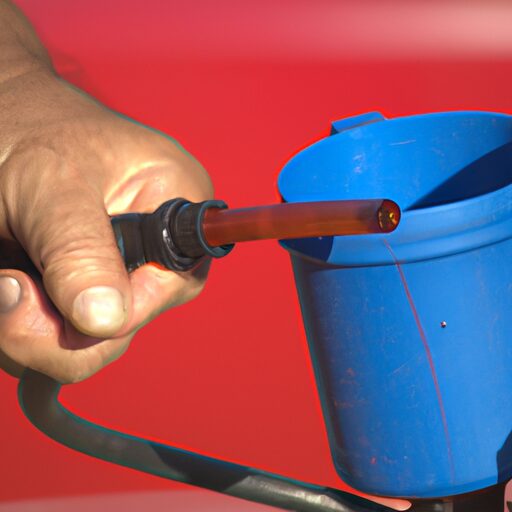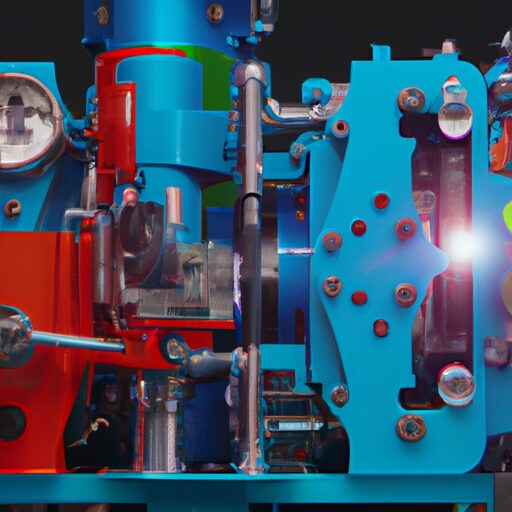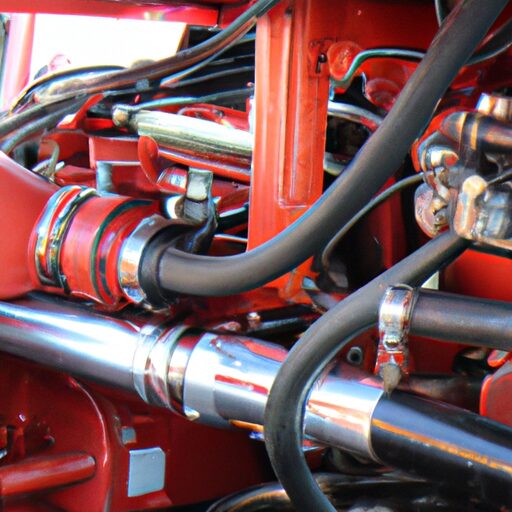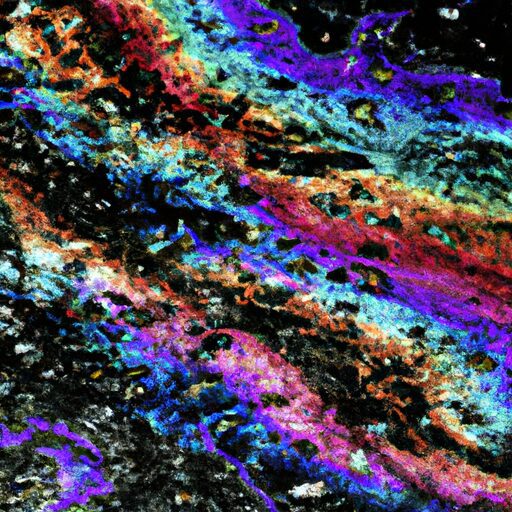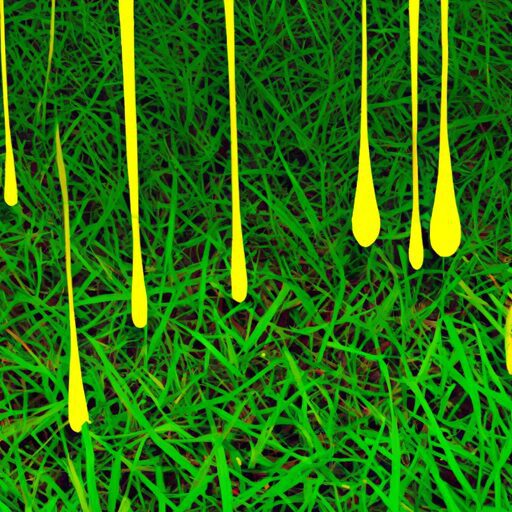Unveiling the Secrets: Common Additives in Hydraulic Fluids
Common additives in hydraulic fluids include antiwear agents, antioxidants, antifoam agents, and corrosion inhibitors. These additives are used to enhance the performance and longevity of hydraulic systems.
They help reduce wear and tear, prevent oxidation, control foaming, and protect against corrosion. Hydraulic fluids contain these additives to maintain the proper functioning of the system and ensure smooth operation and extended lifespan. Additionally, the right combination of additives can improve overall efficiency and decrease maintenance requirements, making hydraulic systems more reliable and cost-effective.
It is crucial to choose the appropriate additives for specific hydraulic applications to optimize performance and maintain system integrity. Understanding the role and importance of these additives in hydraulic fluids is essential for proper maintenance and operation.
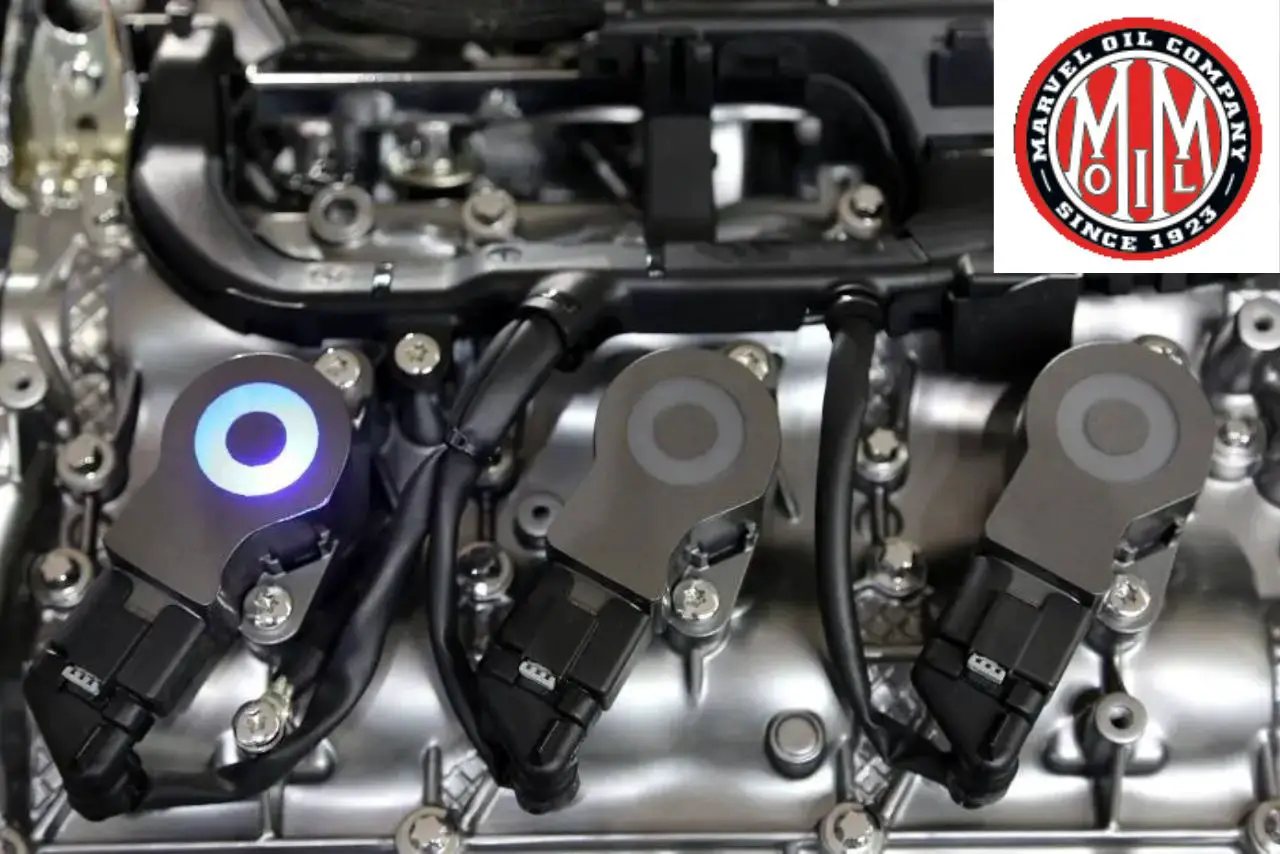
Credit: www.automotivefox.com
The Basics Of Hydraulic Fluids
Hydraulic fluids commonly include additives that improve their performance and longevity. These additives play a vital role in enhancing the fluid’s ability to resist oxidation, reduce wear, prevent corrosion, and maintain viscosity in various operating conditions. Such additives ensure the hydraulic system functions optimally and extends its lifespan.
Importance Of Hydraulic Fluids In Various Industries
- Hydraulic fluids play a critical role in numerous industries, enabling the smooth operation of machinery and equipment.
- These fluids are responsible for transmitting power within hydraulic systems, allowing them to perform essential functions.
- Various industries, such as construction, manufacturing, agriculture, and automotive, heavily rely on hydraulic systems to carry out their operations effectively.
- Without the proper hydraulic fluid, these industries would struggle to maintain efficiency and productivity.
- The choice and quality of hydraulic fluids directly impact the performance and longevity of hydraulic systems.
Understanding The Composition Of Hydraulic Fluids
- Hydraulic fluids are specially formulated liquids designed to meet the unique demands of hydraulic systems.
- These fluids typically consist of a base oil, which provides lubrication and heat transfer properties.
- The composition may also include a variety of additives, which enhance the fluid’s performance and protect against wear and tear.
- The base oil can be mineral-based, synthetic, or a combination of both, depending on the specific application.
- Other components, such as anti-foaming agents and corrosion inhibitors, are added to ensure optimal performance and system protection.
Role Of Additives In Enhancing Hydraulic Fluid Performance
- Additives are crucial components of hydraulic fluids that aim to improve and enhance their performance in various ways.
- They are carefully selected and incorporated into hydraulic fluids to address specific challenges and requirements.
- Additives can enhance the lubricating properties of the fluid, reducing friction and wear on hydraulic system components.
- They also improve the fluid’s thermal stability, allowing it to withstand high operating temperatures without significant degradation.
- Furthermore, additives in hydraulic fluids help control foaming, prevent corrosion, and maintain proper seal compatibility.
- The inclusion of additives ensures that hydraulic fluids consistently deliver outstanding performance and protection.
Hydraulic fluids are essential in a wide range of industries, enabling the efficient operation of hydraulic systems. These fluids consist of a base oil and various additives that work together to provide lubrication, thermal stability, anti-foaming properties, corrosion resistance, and more.
Through the careful selection and incorporation of additives, hydraulic fluids are optimized to enhance performance and protect the system components.
Unveiling The Secrets: Common Additives In Hydraulic Fluids
Uncover the hidden additives found in hydraulic fluids, revealing their importance and function in enhancing performance and longevity. Understand the role these common additives play in maintaining efficient hydraulic systems.
The Significance Of Additives In Hydraulic Fluids
Hydraulic fluids are the lifeblood of hydraulic systems, powering the smooth functioning of various machinery and equipment. However, their performance can be greatly enhanced by the addition of certain additives. These additives play a crucial role in ensuring the longevity and efficiency of hydraulic fluids.
Let’s dive deeper into the significance of additives in hydraulic fluids:
- Improving Viscosity: Additives are often used to enhance the viscosity of hydraulic fluids. They help maintain optimal flow properties, preventing excessive friction and wear in the system. Additionally, additives ensure smooth operation across a wide range of temperatures.
- Controlling Oxidation: Oxidation can cause hydraulic fluids to degrade over time, leading to decreased performance and potential system failure. Additives combat these effects by controlling oxidation, extending the lifespan of the fluid and the system.
- Preventing Foaming: The presence of air bubbles, or foam, in hydraulic fluids can negatively impact their performance. Additives are employed to prevent foaming, maintaining consistent fluid behavior and reducing the risk of spongy or erratic operation.
- Inhibiting Corrosion: Hydraulic systems are prone to corrosion, which can result in irreversible damage. Additives with corrosion inhibitors are added to hydraulic fluids to protect against rust and other forms of deterioration, increasing the lifespan of the system.
- Enhancing Anti-Wear Properties: Components within hydraulic systems experience constant contact and friction, leading to wear over time. Additives that improve anti-wear properties are used to reduce wear and extend the lifespan of system components, minimizing downtime and maintenance costs.
Exploring The Types Of Additives Used In Hydraulic Fluids
Various types of additives are incorporated into hydraulic fluids to accomplish specific functions. These additives work synergistically to optimize the performance of the fluid and system. Let’s take a closer look at the different types of additives commonly used in hydraulic fluids:
- Viscosity Index Improvers: These additives help regulate the viscosity of the fluid, ensuring consistent performance across a wide range of temperatures. They enable the hydraulic fluid to maintain its optimal thickness and flow properties, regardless of the operating conditions.
- Anti-wear Additives: These additives form a protective film on the metal surfaces within the hydraulic system, reducing friction and wear. By minimizing contact and preventing metal-to-metal interactions, anti-wear additives extend the life of the system components.
- Anti-foaming Agents: Hydraulic fluids are susceptible to foaming, which can negatively affect their performance. Anti-foaming agents are added to prevent the formation and persistence of foam, ensuring smooth and efficient fluid flow.
- Rust and Corrosion Inhibitors: These additives protect the hydraulic system from the detrimental effects of moisture and oxidation. By forming a protective barrier on metal surfaces, rust and corrosion inhibitors help prevent the degradation of the system and maintain its longevity.
- Pour-point Depressants: In colder temperatures, hydraulic fluids tend to become thicker, impeding their flow and performance. Pour-point depressants lower the fluid’s pour point, allowing it to maintain necessary flow characteristics even in low-temperature environments.
How Additives Improve The Performance Of Hydraulic Fluids
The addition of carefully selected additives significantly enhances the performance of hydraulic fluids, ensuring smooth operation and prolonging the life of the hydraulic system. Here’s how these additives achieve these improvements:
- Optimal Lubrication: Additives improve the lubricating properties of hydraulic fluids, reducing friction and wear between moving parts. The enhanced lubrication minimizes energy loss, heat generation, and component damage, resulting in improved overall system efficiency.
- Temperature Stability: Additives help maintain the optimal viscosity of hydraulic fluids across a wide range of temperatures. This ensures consistent performance, even in extreme operating conditions, avoiding viscosity-related problems such as excessive heat buildup or sluggish operation.
- Detergent and Dispersant Action: Some additives act as detergents and dispersants, preventing the accumulation of contaminants, sludge, or varnish within the hydraulic system. By keeping the system clean, these additives promote efficient operation and prevent clogs or blockages.
- Anti-rust Protection: Hydraulic fluids with additives containing rust inhibitors provide an extra layer of protection to system components. The inhibitors help prevent corrosion and rust formation, preserving the integrity of the system and prolonging its lifespan.
- Compatibility Enhancement: Additives are formulated to be compatible with different hydraulic systems and component materials. This compatibility ensures that the hydraulic fluid and additives work harmoniously together, reducing the risk of adverse reactions and optimizing performance.
Additives in hydraulic fluids play a crucial role in improving viscosity, controlling oxidation, preventing foaming, inhibiting corrosion, enhancing anti-wear properties, and overall, boosting the performance and longevity of hydraulic systems. By understanding the significance and types of additives, you can make informed decisions when selecting hydraulic fluids for your specific application needs.
Anti-Wear Additives
Anti-wear additives are commonly found in hydraulic fluids and play a crucial role in preventing friction and wear on moving parts. These additives enhance the fluid’s lubricating properties, ensuring smooth operation and longer equipment life.
Understanding The Role Of Anti-Wear Additives In Hydraulic Fluids
Anti-wear additives play a crucial role in ensuring the optimal performance and longevity of hydraulic systems. They are specifically designed to reduce friction and wear between moving parts, which can occur due to non-lubricated contact. By forming a protective layer on the metal surfaces, these additives prevent metal-to-metal contact and minimize the damage caused by friction and high pressure.
With their unique properties, anti-wear additives contribute to the smooth operation of hydraulic systems, increasing their efficiency and overall lifespan.
Examining The Commonly Used Anti-Wear Additives
There are several commonly used anti-wear additives that are incorporated into hydraulic fluids. These additives work synergistically to enhance the overall performance and protection provided by the hydraulic fluid. Let’s take a closer look at some of these additives:
- Zinc Dialkyl Dithiophosphate (ZDDP): ZDDP is one of the most widely used anti-wear additives in hydraulic fluids. It forms a protective film on metal surfaces, reducing friction and wear. This additive is effective over a wide range of operating conditions and temperatures.
- Ashless : These additives do not contain metallic elements like zinc and phosphorus. They offer excellent anti-wear protection and prevent the formation of deposits and sludge in the hydraulic system. Ashless additives are compatible with modern hydraulic systems and are environmentally friendly.
- Phosphorus Anti-Wear Additives: Phosphorus-based additives provide excellent anti-wear protection by forming a protective film on metal surfaces. They are particularly effective in high-pressure hydraulic systems and offer superior safety during extreme operating conditions.
Benefits Of Using Anti-Wear Additives In Hydraulic Systems
The inclusion of anti-wear additives in hydraulic fluids brings several benefits to the overall performance and longevity of hydraulic systems. Here are some key advantages:
- Enhanced Wear Protection: Anti-wear additives form a protective layer on metal surfaces, reducing friction and wear. This helps to minimize component damage and extends the lifespan of hydraulic systems.
- Improved Efficiency: With reduced friction between moving parts, hydraulic systems operate more smoothly and efficiently. The use of anti-wear additives ensures optimum performance and helps to maintain the system’s overall efficiency.
- Extended Maintenance Intervals: By providing superior wear protection, anti-wear additives help to reduce the need for frequent maintenance and component replacements. This can result in cost savings and increase the productivity of hydraulic systems.
- Reliable Performance in Extreme Conditions: Hydraulic systems often operate under demanding conditions, including high temperatures and pressures. Anti-wear additives offer increased protection during these extreme operating conditions, ensuring the system performs reliably.
- Compatibility and Environmental Friendliness: Many anti-wear additives are designed to be compatible with a range of hydraulic systems and components. They are also formulated to be environmentally friendly, reducing the impact on ecosystems while providing efficient protection.
Anti-wear additives are vital components of hydraulic fluids that protect moving parts from wear and enhance the overall performance and longevity of hydraulic systems. By reducing friction and minimizing metal-to-metal contact, these additives contribute to smooth operations, increased efficiency, and extended maintenance intervals.
Incorporating the appropriate anti-wear additives ensures reliable performance even in extreme operating conditions, while also being compatible and environmentally friendly.
Viscosity Index Improvers
Viscosity Index Improvers are common additives in hydraulic fluids that help maintain optimal viscosity levels under extreme temperatures and operating conditions. These additives enhance the fluid’s resistance to thinning or thickening, ensuring consistent performance and protection for hydraulic systems.
Definition And Purpose Of Viscosity Index Improvers
Viscosity index improvers play a crucial role in hydraulic fluids by enhancing their stability and performance. These additives are specifically designed to maintain consistent viscosity levels over a wide range of temperatures. Below are the key points outlining the definition and purpose of viscosity index improvers:
- Viscosity index improvers are chemical additives incorporated into hydraulic fluids to regulate the oil’s resistance to flow or its viscosity.
- Their primary purpose is to reduce the effects of temperature changes on hydraulic fluid viscosity, ensuring optimal lubrication and protection in different operating conditions.
- By improving the viscosity index, these additives enable hydraulic fluids to maintain their viscosity stability, preventing excessive thinning at high temperatures and thickening at low temperatures.
- Viscosity index improvers act as viscosity modifiers, allowing hydraulic fluids to perform efficiently in varied temperature environments, from cold starts to high operating temperatures.
Commonly Used Viscosity Index Improvers In Hydraulic Fluid Formulations
A wide range of viscosity index improvers are used in hydraulic fluid formulations, each offering distinct benefits. Here are some commonly used additives:
- Ethylene Propylene Copolymer (EPM, EPDM): Widely utilized in hydraulic fluids, these elastomers provide good shear stability, offering consistent viscosity control across temperature ranges.
- Polyisobutylene (PIB): Often chosen for its excellent thermal stability, PIB viscosity index improvers effectively reduce oil thinning at elevated temperatures.
- Polymethacrylate (PMA): Known for its shear stability and high resistance to oxidation, PMA viscosity index improvers maintain viscosity under extreme conditions, enhancing overall fluid performance.
- Styrene Isoprene Styrene (SIS): This elastomeric additive offers good low-temperature fluidity while maintaining stability at higher temperatures.
- Alkylated Naphthalene: Frequently used in multigrade hydraulic fluids, alkylated naphthalene viscosity index improvers enhance oil flow properties across a wide temperature range.
- Olefin Copolymer (OCP): These additives provide significant stability to hydraulic fluids, ensuring consistent viscosity performance across diverse operating conditions.
How Viscosity Index Improvers Enhance The Stability Of Hydraulic Fluids
Viscosity index improvers enhance the stability of hydraulic fluids by effectively managing viscosity changes caused by temperature fluctuations. Their contributions include:
- Maintaining consistent viscosity: By expanding or contracting under different temperature conditions, viscosity index improvers prevent excessive viscosity changes. This ensures that the hydraulic fluid retains the desired resistance to flow, regardless of the operating temperature.
- Improving lubrication properties: With their ability to regulate viscosity, these additives ensure optimal lubrication and film thickness, reducing friction and wear between moving parts within hydraulic systems.
- Preventing damage from temperature extremes: Hydraulic systems often encounter extreme temperature variations. Viscosity index improvers safeguard against oil thinning at high temperatures, preventing potential equipment damage. Likewise, they inhibit significant thickening at low temperatures, ensuring smooth operation during cold starts or in frigid environments.
- Enhancing system efficiency: By maintaining consistent viscosity across a wide temperature range, viscosity index improvers contribute to improved overall hydraulic system efficiency, reducing energy wastage and maximizing performance.
Viscosity index improvers are essential additives in hydraulic fluids. Their ability to regulate viscosity across varying temperatures plays a vital role in ensuring efficient and reliable hydraulic system operation.
Antioxidants And Anti-Foam Additives
Antioxidants and anti-foam additives are common ingredients found in hydraulic fluids. These additives help to prevent oxidation and foam formation, ensuring smooth and efficient operation of hydraulic systems.
Importance Of Antioxidants In Preventing Fluid Degradation
Antioxidants play a vital role in hydraulic fluids as they help prevent fluid degradation, ensuring the longevity and optimal performance of the system. Here are a few key points to understand their importance:
- Oxidation is a natural process that occurs when hydraulic fluids come into contact with air or high temperatures. Antioxidants act by inhibiting the formation of harmful free radicals that cause oxidation. This helps maintain the fluid’s stability and effectiveness over time.
- By preventing fluid degradation, antioxidants help preserve the system’s components and reduce the risk of costly repairs and downtime.
- Antioxidants increase the fluid’s resistance to viscosity changes, ensuring it remains at the desired thickness regardless of temperature variations.
- They also inhibit the formation of sludge, deposits, and varnish, which can clog filters, valves, and other critical components.
Examining The Different Types Of Antioxidants Used In Hydraulic Fluids
Hydraulic fluids utilize various types of antioxidants, each designed to cater to specific needs. Let’s explore some common types:
- Phenolic antioxidants: These antioxidants are highly effective in minimizing fluid oxidation caused by heat and pressure. They offer excellent thermal stability and are often used in high-temperature applications.
- Aromatic amine antioxidants: Ideal for preventing oxidation caused by metal catalysts, aromatic amine antioxidants provide exceptional protection against corrosion.
- Hindered phenol antioxidants: Known for their superior ability to prevent fluid degradation, hindered phenols are used in hydraulic fluids that are exposed to extended service intervals or harsh operating conditions.
- Amine-based antioxidants: These antioxidants are effective at preventing oxidation caused by the presence of copper or other metals in the hydraulic system. They help maintain fluid performance and extend the life of system components.
Role Of Anti-Foam Additives In Minimizing Air Entrainment And Foam Formation
Anti-foam additives are a crucial component of hydraulic fluids as they minimize air entrainment and foam formation. Consider the following points to understand their role:
- Foam, an undesirable side effect in hydraulic systems, can lead to reduced performance, erratic operation, and potentially result in damage to the system.
- Anti-foam additives help to break up foam bubbles, ensuring the fluid remains free from excessive air entrainment.
- These additives work to reduce the surface tension of the fluid, preventing the formation of stable foam bubbles.
- By minimizing foam formation, anti-foam additives promote efficient hydraulic system operation, preventing air pockets that could impair the system’s performance or lead to cavitation.
- Anti-foam additives also help maintain consistent hydraulic pressure, preventing spongy or inconsistent responses in hydraulic systems.
Remember, both antioxidants and anti-foam additives are crucial for the optimal performance and longevity of hydraulic fluids. By understanding their importance and the various types available, you can make informed decisions when selecting hydraulic fluids that best suit your system’s requirements.
Corrosion And Rust Inhibitors
Corrosion and rust inhibitors are common additives found in hydraulic fluids. These additives prevent the formation of rust and corrosion, ensuring the smooth operation and longevity of hydraulic systems. Protecting against damage caused by oxidation, these inhibitors are essential for maintaining optimal performance.
Understanding The Need For Corrosion And Rust Inhibitors In Hydraulic Fluids
Corrosion and rust inhibitors play a crucial role in ensuring the optimal performance and longevity of hydraulic systems. These additives are specifically designed to prevent or minimize the detrimental effects of corrosion and rust on system components. By understanding the need for corrosion and rust inhibitors, you can make informed decisions about the type of hydraulic fluid to use in your applications.
Exploring The Types Of Corrosion And Rust Inhibitors Commonly Used
To effectively combat corrosion and rust, hydraulic fluids are often fortified with various types of inhibitors. Here are some of the commonly used corrosion and rust inhibitors:
- Phosphates: Phosphate-based inhibitors form protective layers on metal surfaces, preventing corrosive elements from coming into contact with the metal.
- Amines: Amines act as alkaline agents, neutralizing acidic substances that can lead to corrosion and rust.
- Benzotriazoles: Benzotriazoles provide a protective barrier on metal surfaces, inhibiting corrosion from occurring.
- Organic acids: Organic acids, such as benzoic acid and sorbic acid, can slow down or prevent the formation of rust on metal components.
- Silicates: Silicates create a protective film on metal surfaces, preventing corrosion and rust from taking hold.
How Corrosion And Rust Inhibitors Protect Hydraulic System Components
Corrosion and rust inhibitors in hydraulic fluids are crucial for protecting system components in several ways:
- Preventing metal degradation: By forming a protective barrier on metal surfaces, corrosion and rust inhibitors prevent the corrosive elements from coming into contact with the metal, thereby mitigating the risk of degradation.
- Extending component lifespan: Corrosion and rust inhibitors help prolong the lifespan of hydraulic system components by reducing or eliminating the harmful effects of corrosion and rust. This leads to increased efficiency and reduced maintenance costs.
- Improving system reliability: By using hydraulic fluids with corrosion and rust inhibitors, you can ensure that system components remain in optimal condition, reducing the likelihood of unexpected failures or downtime.
- Enhancing performance: Corrosion and rust inhibitors help maintain the smooth operation of hydraulic systems by preventing the formation of rust and corrosion-related issues that can hinder performance.
Corrosion and rust inhibitors are essential additives in hydraulic fluids. They protect system components from degradation, extend component lifespan, improve system reliability, and enhance overall performance. By understanding the types of inhibitors commonly used and their protective mechanisms, you can make informed choices for the longevity and efficiency of your hydraulic systems.
Pour Point Depressants
Pour point depressants are common additives used in hydraulic fluids to improve their low-temperature performance. These additives help prevent the formation of wax crystals that can hinder the flow of fluid, ensuring smooth operation in cold conditions.
Definition And Purpose Of Pour Point Depressants
- Pour point depressants are additives used in hydraulic fluids to improve the low-temperature performance of the fluids.
- They are designed to prevent the formation of solid crystals that can obstruct the flow of hydraulic fluids in cold weather conditions.
- Pour point depressants work by modifying the wax crystal structure that forms as the temperature drops, allowing the fluid to maintain its flowability at lower temperatures.
- These additives are essential for hydraulic systems operating in regions with cold climates or during winter months when temperatures dip below freezing.
Examining The Effectiveness Of Pour Point Depressants In Cold Weather Conditions
- Hydraulic fluids typically contain base oils that can thicken and solidify in cold temperatures, leading to increased viscosity and reduced flowability.
- Pour point depressants combat this issue by lowering the pour point of hydraulic fluids, which is the lowest temperature at which the fluid can flow.
- By reducing the pour point, pour point depressants ensure that hydraulic fluids remain smoothly flowing in cold weather conditions.
- The effectiveness of pour point depressants depends on various factors, including the concentration and type of additive used, as well as the base fluid composition.
- Extensive testing and analysis are conducted to determine the optimal concentration of pour point depressants required for specific hydraulic fluid formulations based on the expected operating temperature range.
Benefits Of Using Pour Point Depressants In Hydraulic Fluids
- Improved cold-weather performance: By preventing the formation of solid crystals, pour point depressants enable hydraulic fluids to maintain their flowability even at low temperatures. This ensures the smooth operation of hydraulic systems in cold weather conditions.
- Enhanced equipment reliability: When hydraulic fluids are allowed to flow freely without any obstruction, the risk of damage to hydraulic system components, such as pumps or valves, due to excessive pressure or cavitation is significantly reduced.
- Increased efficiency: Hydraulic systems using pour point depressants experience minimal flow resistance, resulting in efficient power transmission and reduced energy consumption.
- Extended equipment lifespan: By preventing the buildup of solid deposits in hydraulic components, pour point depressants can help prolong the lifespan of seals, pumps, and other system elements, reducing maintenance and replacement costs.
- Versatile application: Pour point depressants can be used in various hydraulic systems, including mobile equipment, industrial machinery, and automotive applications, ensuring reliable performance across different sectors.
Pour point depressants play a crucial role in optimizing the cold-weather performance of hydraulic fluids. By lowering the pour point and preventing the formation of solid crystals, these additives ensure smooth flow, improved reliability, increased efficiency, and extended lifespan of hydraulic systems.
Incorporating pour point depressants in hydraulic fluids is essential for maintaining optimal hydraulic performance in cold weather conditions.
Frequently Asked Questions For Common Additives In Hydraulic Fluids
What Are Additives Used In Hydraulic Fluids?
Additives used in hydraulic fluids improve performance and protect against wear, oxidation, foaming, and corrosion.
What Are The 4 Oil Additives?
The 4 oil additives are detergents, dispersants, anti-wear agents, and viscosity modifiers.
What Are The 6 Different Oil Additives?
The 6 different oil additives are friction modifiers, detergent additives, antioxidant additives, viscosity index improvers, anti-wear additives, and corrosion inhibitors.
What Is The Major Source Of Chemical Contaminants In Hydraulic Fluid?
The major source of chemical contaminants in hydraulic fluid is due to external factors and system wear.
Conclusion
Overall, understanding the common additives found in hydraulic fluids is essential for maintaining the performance and longevity of hydraulic systems. These additives serve specific purposes, such as improving viscosity, reducing oxidation, preventing corrosion, and enhancing overall performance. By having a clear understanding of these additives, hydraulic system operators can make informed decisions when selecting the right hydraulic fluid for their systems.
Regular maintenance and monitoring of the fluid’s condition is crucial to ensure that these additives are working effectively. Additionally, it is important to follow manufacturer recommendations for fluid changes and filter replacements. By doing so, hydraulic systems can operate at their optimum level, reducing the risk of equipment failure and costly repairs.
With ongoing advancements in additives and fluid technology, it is crucial to stay updated on the latest developments in hydraulic fluid additives to ensure optimal performance and efficiency in hydraulic systems.

